Spencer Pratt Has Always Understood the Assignment
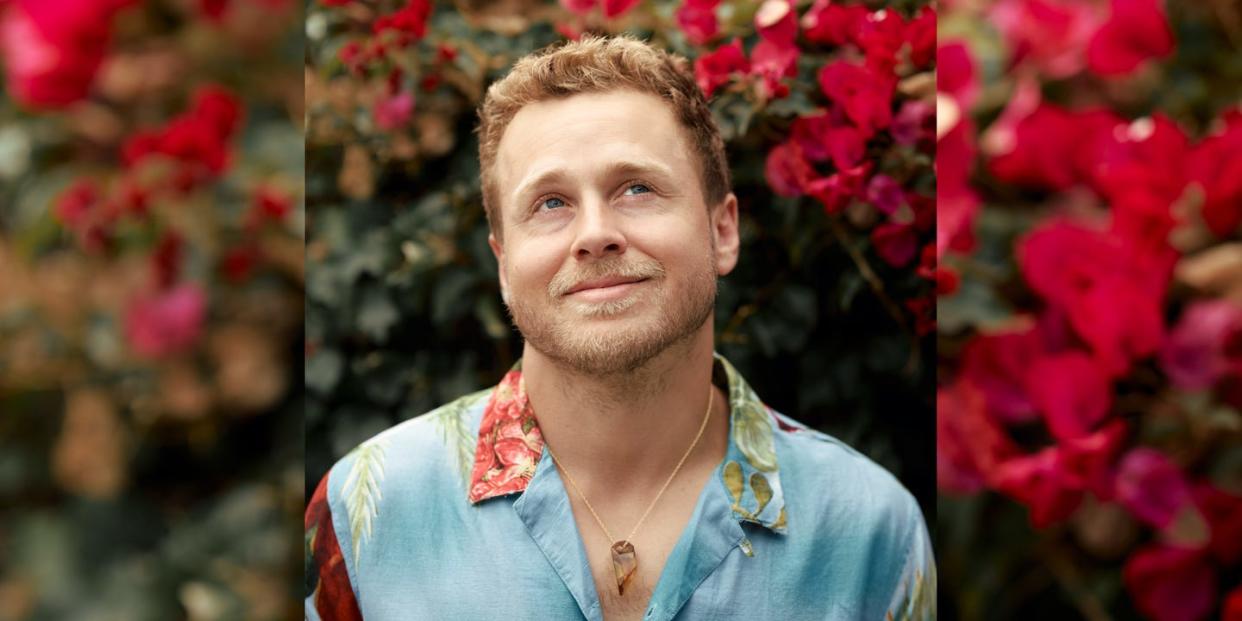
- Oops!Something went wrong.Please try again later.
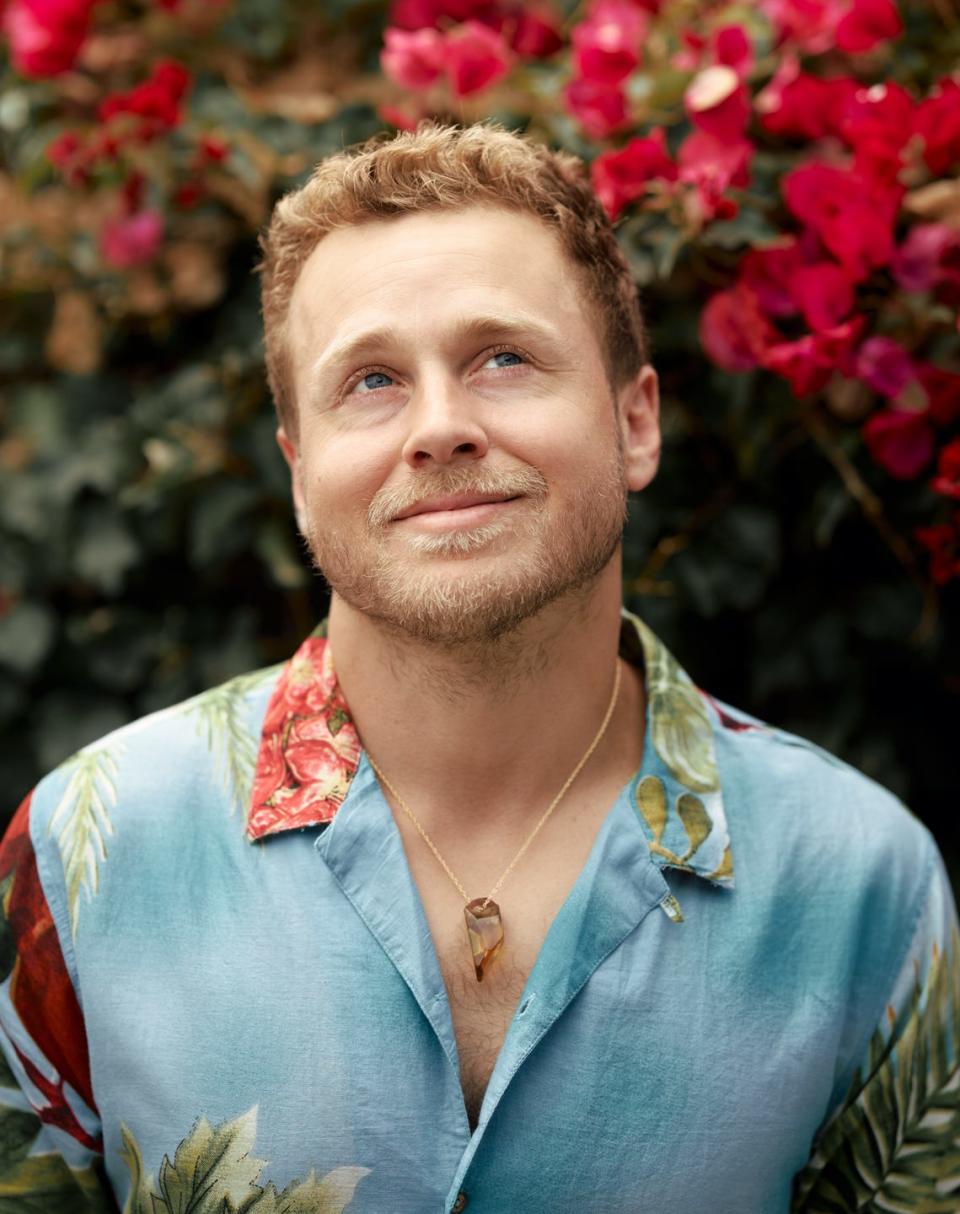
“I want a hit show so fucking bad,” Spencer Pratt yells.
He’s sitting on a couch inside the corporate headquarters of cannabis startup Cannabiotix, a sprawling manufacturing plant and office space in Cudahy, California, 10 miles southeast of Downtown L.A., tucked against the 710 freeway. His comment isn’t directed at anyone; it’s Pratt thinking to himself. But the 38-year-old, never one to hold his tongue, vocalizes the sentiment to the small film crew he’s contracted to help produce a sizzle reel for what, he hopes, will turn him into a multi-millionaire reality TV mogul.
Hang around Pratt long enough and these naked admissions about coveting fame become routine. No one else in the crowded, cramped office lounge even registers the comment. The cameraman and sound tech continue preparing for the talking head interview Pratt is about to conduct, the photographer Pratt’s hired to take still photos continues snapping away.

Wanting a hit show hardly makes Pratt exceptional in Los Angeles, a city where everyone is desperate for fame. Pratt is remarkable, however, in his unabashed pursuit of it. Fifteen years after cementing himself as the original reality TV bad boy, Pratt is still openly pining for celebrity, success, and wealth (or as he says, “getting checks”).
There is a sense of urgency to the announcement. Two week earlier, MTV cancelled its reboot of The Hills, the seminal reality TV series that made Pratt infamous in the late aughts. Pratt hoped the new iteration would resurrect his reality TV career, deliver him the kind of stratospheric fame to which he’s always aspired, and allow him to ride out the rest of his days as an overpaid reality star. Instead, the reboot went largely ignored.
“I'm still in shock. We just lost a fucking TV show,” Pratt tells me later. “It's been an emotional rollercoaster. I was arguing with a few of the cast members who said, ‘We don’t need the network. We just need a boom mic and some cameras and we can do it ourselves.’ And I’m like, ‘Bro, I've been filming myself for five years. There's nothing like being on a television show.’”
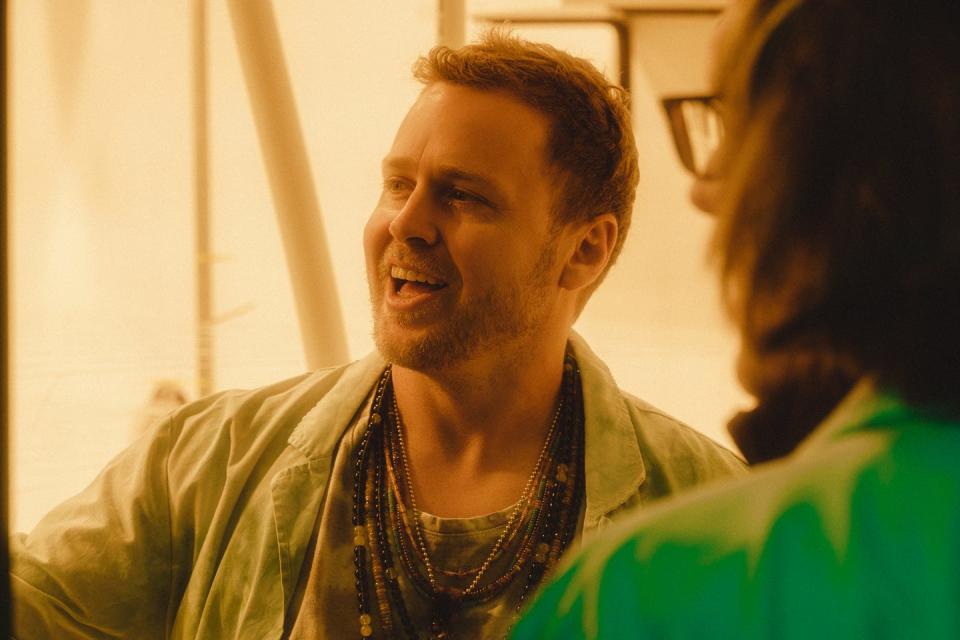
They could have been like the Jersey Shore cast, he says, minting million dollar checks every few years for a reunion show. But Pratt’s cast-mates are no longer as willing to act reckless on camera for money, something Pratt has never had any qualms about. He wants to fill the void in his calendar by creating a new hit reality TV show, this time pulling the strings behind the camera as a producer. Pratt sits on a green loveseat across from Eran Haroni, a bald, bearded, slightly-built, effortlessly cool fashion mogul dressed in a Brentwood Country Mart sweater, a limited “drop” he bought off Instagram, and pink Nikes. (Later, this man will hand me a sack of the dankest weed I’ve ever encountered in my 20 year history with the substance. The bag left my car skunky for a week.)
Haroni is the owner of Cannabiotix and one of two main co-stars in the reality show Pratt—wearing a gray and brown tie-dye T-shirt, charcoal jeans and eight crystal necklaces worth a combined $10,000—hopes to sell. Pratt peppers Haroni with questions about his booming weed business. Cannabiotix earned $36 million in revenue last year and is expanding rapidly. The company just purchased a large plot of real estate across the street, and Pratt films the company co-owners walking the premises, talking about their plan to build a new production facility on the site.
“Fucking nailed it,” Pratt tells Haroni at the conclusion of the interview.
Later, Pratt tries to coax answers out of Madalyn Taylor, Cannabiotix’s beautiful but painfully shy vice president of operations. “You’re doing it!” Pratt encourages her. “You’re doing great. Just say you’re nervous. Say it all.”
He imagines a show that is equally about the brand’s rise to the top of the cannabis industry as it is about the relationship between Haroni and his partner Neema Samari, one of the most decorated marijuana horticulturists in the world. (If that doesn’t sound like much of a story arc, then remember the key to a hit reality TV show is not the plot, but the personalities.)
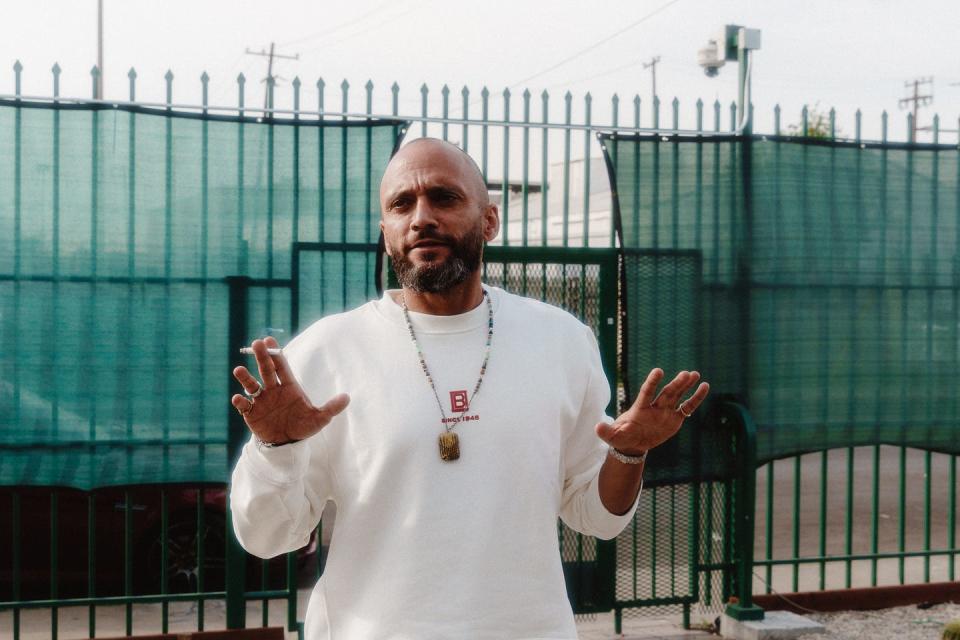
Whatever you think of Pratt—whether you consider him a self-promoter of the most shameless ilk, someone willing to debase himself and exploit his personal relationships for fame, or a deft cultural operator on par with Kim Kardashian, as some have argued—Pratt has proven, time and again, to have an innate understanding of the machinations of celebrity. He invented being an infamous reality TV villain. Instead of avoiding the tabloids, he worked with them to ensure he and his wife, Heidi, were always in the cultural conversation, a strategy A-List celebrities would later emulate. (All of the salacious tabloid covers were fabricated with the Pratts’ help, he says.) He cultivated a massive following on Snapchat long before the app started helping creators monetize their presence on the platform.
“Nowadays the audience is so much smarter. They get it, they understand it’s about money,” Pratt tells me on the drive back from the shoot. “There’s a meme that I love. Modern audiences say, ‘They understood the assignment.”
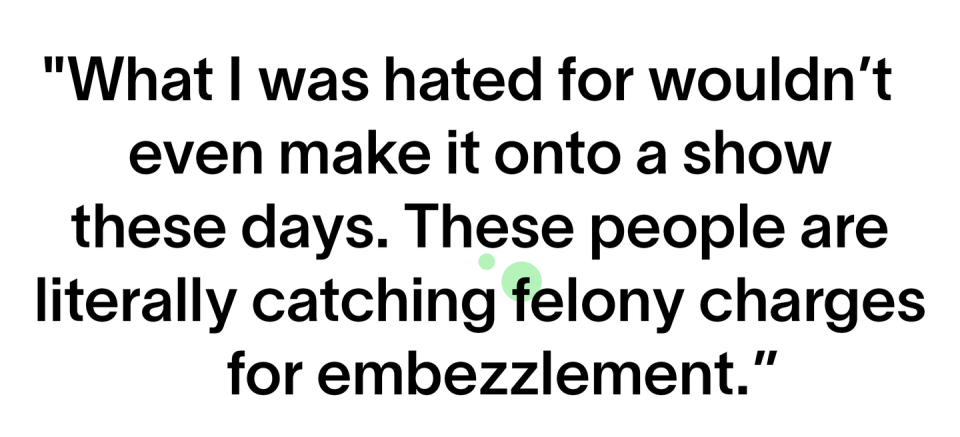
Pratt has always understood the assignment: The people just want a good show, and it’s a celebrity’s job to give it to them. The problem with always being ahead of your time, though, is you’re never successful in the moment. Your ideas can only be appreciated in retrospect, after they’ve been co-opted by those who came in your wake.
Pratt craves respect for how he's mastered that game, sometimes, it seems, even more than he does fame, itself. “No matter how successful I was, I always felt like people were always talking down to me and treating me like I was a little kid,” Pratt says. “And now I'm about to be 40, and I still feel that energy sometimes.”
There is a parallel universe in which Pratt is unknown outside of the insular world of Hollywood production circles.
When Pratt was 20 years old, he grabbed a camcorder and filmed a day in the life of his best friend Brody Jenner. The culture was fascinated by the lives of young people in Southern California—The O.C. and its reality TV counterpart Laguna Beach were met with frenzied fandom—and Pratt, ever the opportunist, sought to capitalize with a show of his own. “I said, ‘I’ll let you film me if you show up at 8 a.m. on the dot.’ And he did,” Jenner remembers. “The only reason I’m on reality television is because of Spencer. He is Mr. Hustle.”
Pratt’s homemade video piqued the interest of executives at Fox, but on the day of his introductory meeting, a producer stole his drive-on pass to the studio and assumed Pratt’s role as the show’s primary producer. Pratt still received an executive producer credit, but by the time he arrived at the meeting, it had already been decided that he would not be the creative vision behind the project. Princes of Malibu had a six episode run on Fox before its cancellation.
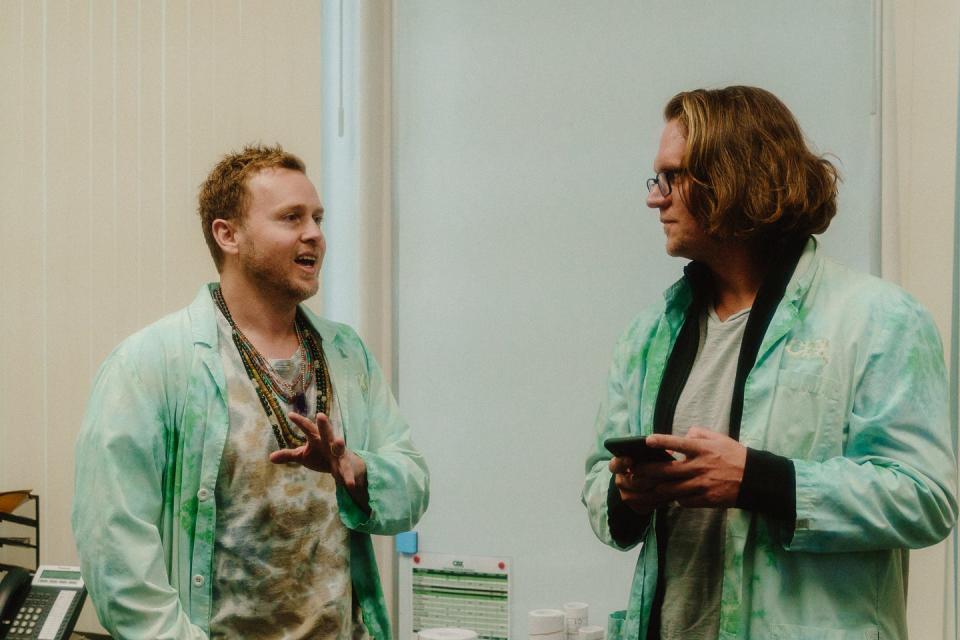
Had Pratt made that meeting on time, he likely would have been one of the youngest lead producers in all of Hollywood. And in this alternate reality, Pratt goes on to become the brains behind multiple reality TV franchises that helped define Millennial culture. He’s a reality TV kingmaker who is less famous, but wealthier and more respected by his peers, than he is now.
But that’s not what happened, of course. Instead of pursuing more projects as a producer, Pratt decided to jump in front of the camera for a Laguna Beach spin-off called The Hills, a decision that irrevocably altered the trajectory of his life, for better and worse. He became a household name, a millionaire, and one of the most reviled men in America.
The Hills was, ostensibly, about the illustrious lives of a group of early-20s friends trying to make their way, personally and professionally, in Los Angeles. (A show glamorizing the lives of self-important, ultra-privileged white yuppies, whose biggest problems are petty interpersonal dramas, seems vapid, if not a bit distasteful, in retrospect.) Pratt was introduced in Season Two as the boyfriend of Heidi Montag, one of the show’s original stars, and immediately displayed a preternatural talent for stirring shit up. “Spencer actually told me, from the beginning, that he wanted to be the most hated person on the planet,” says Jenner, who also regularly appeared on The Hills. “And he did it. He really is a master of manifestation.”
If being hated was the goal, then Pratt was wildly successful. In 2011, a year after The Hills ended, he was named the second most-hated celebrity in America, according to an annual market research poll. He was more hated than O.J. Simpson, a perennial honoree on the list. The only person above him on the list was Casey Anthony, a woman many believe killed her own daughter. (She was acquitted.)
Knowing that, Pratt’s run on The Hills can be considered performance art on par with Andy Kaufman, the 1970s anti-comic who more or less invented the art of shitposting, although Kaufman’s shtick was as a stage performer. Kaufman was so committed to his unique brand of anti-comedy that when he died of cancer in 1984, many thought he staged his death as a bit.
Pratt was notorious for blowing up at his fellow cast-mates, berating them in public at bars and clubs, and in private, at parties and during serious sit-down conversations in their homes. He called his younger sister a “crazy bitch” at a barbecue. He kicked Montag out of his car and drove away, stranding her in a parking lot. He got so angry with Jenner one night at a club that you could see veins protruding from his forehead. He was angry and volatile and petty and liable to explode at any given moment, and it made for undeniably gripping television.
It was all calculated, Pratt says. Before the show began, David Foster, Jenner’s stepfather and 16-time Grammy winner, told Pratt that people hated Simon Cowell because Cowell was the only American Idol judge willing to speak the unvarnished truth. Pratt took the advice to heart, calling people out to their faces. Most of his worst moments, meanwhile, were entirely staged. “People thought I was a monster for leaving Heidi in a shady alley. We shot that scene 14 times, from every angle you could think of.” When Pratt gave a heartfelt apology to Lauren Conrad over the phone, he was actually talking to a producer. (Pratt and his sister did have a real life falling out, though, and their relationship remains strained.)
Pratt’s offenses are downright quaint by contemporary standards. Numerous famous men have had their careers ended and reputations permanently marred over the past several years due to revelations about their years of bullying, harassing, and abusive behavior (sexual and otherwise). Several Real Housewives stars have been convicted of white collar crimes. All Pratt ever did was act like a dick on television. “What I was hated for wouldn’t even make it onto a show these days,” Pratt says. “These people are literally catching felony charges for embezzlement.”
For all his skill courting fame on screen, Pratt avoided the industry gladhanding vital to a long-term career in Hollywood. While the rest of his Hills co-stars worked the Hollywood scene, attending industry parties, lunching with studio execs, setting themselves up for life after reality TV, Pratt and Montag, who had since married and taken on the moniker “Speidi,” mostly kept to themselves. “Heidi and I, we were just always on our own,” he says. “We had such a level of fame, I had never imagined needing to meet other people.
“I’m supposed to be Kim Kardashian,” Pratt says. “Watch all the early episodes of Kardashians. They copied everything Heidi and I did on The Hills. The only difference between us and the Kardashians, I’ve learned, is you’re only as famous as the media conglomerate bankrolling you. I didn’t understand that once Viacom wasn’t in the Heidi and Spencer business, it was a wrap on the visions I had for us and our success. Comcast didn’t unplug the Kardashians until last year.” (For what it’s worth, pop culture publication The Ringer agrees with Pratt’s self-assessment. Earlier this year, Ringer Dish, the publication’s celeb-focused podcast, released an episode titled, “Spencer Pratt Walked So That Kim Kardashian Could Run.”)
Pratt and Montag moved to Costa Rica after The Hills ended, and aside from the occasional reality show guest appearance, they mostly avoided fame. “I thought I was done,” Pratt says. “Our life back home was tumultuous and we had an opportunity to take a break in paradise and jumped on it. All I did was read books and look at dolphins every day, which was a miracle.” (Pratt and Montag fell in love with Costa Rica while filming I’m a Celebrity… Get me Out of Here!, a reality TV miniseries the couple quit after two days because they were “too rich and famous” to spend time in the jungle, but not before Pratt got baptized by Stephen Baldwin.)
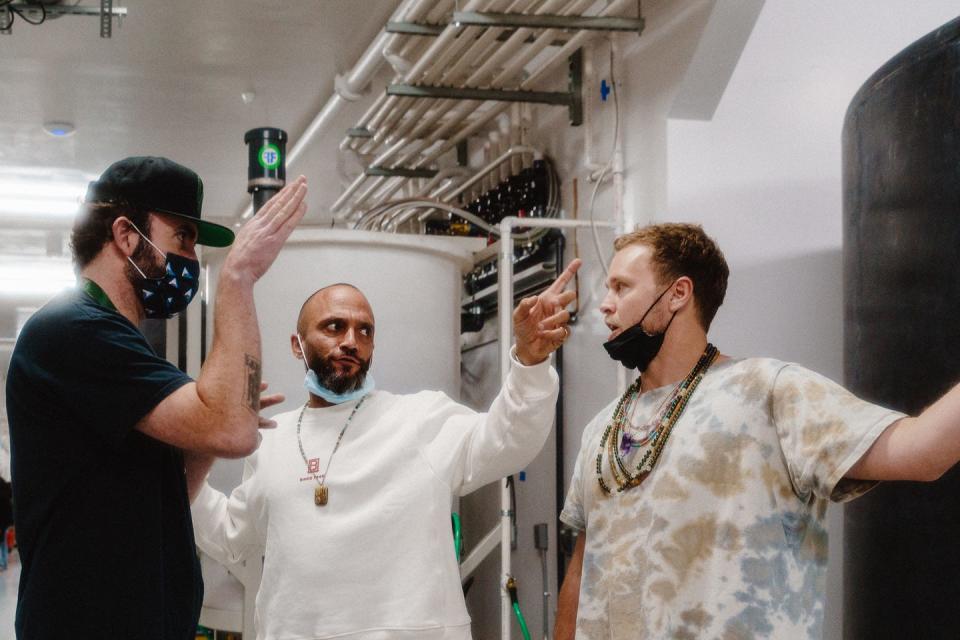
The couple later moved to Santa Barbara, and a curious thing started to happen: Pratt’s image began to soften. Pratt started posting videos to his Snapchat of him enjoying the outdoors, espousing the healing powers of crystals, indulging in Mexican food (his favorite cuisine) and feeding hummingbirds out of the palm of his hand like he was a goddamn Disney princess. His most popular snaps generated 5 million views a piece, he says.
“If you would have told my 2006 self that I would one day idolize Spencer Pratt, I would have never believed you,” says Annabelle Desisto, host of Adderall and Compliments, a podcast that covers reality TV. Like so many millennial women, Desisto grew up despising the star. She was appalled at his brazen rudeness and the way he spoke to women, including his girlfriend. That changed once she discovered Pratt’s Snapchat account. “I thought, This cannot be the monster I knew from before.’” Pratt later appeared on Adderall and Compliments. Desisto even held his and Montag’s baby son, Gunner, when she visited their home.
“Pratt completely changed reality TV,” Desisto says. “There wasn’t a villain on The Osbournes and Simple Life. He set the bar on what a male reality show villain should be. He completely made that his own, and everyone has copied that since then. He’s so smart, and I don’t think people give him the credit he deserves.”
Through Pratt, you can trace the evolution of celebrity over the past 20 years. From reality TV stardom, to the 2000s tabloid boom, to the contemporary content economy. Pratt now finds himself in a media landscape where it’s unclear if celebrity, at least in the traditional definition, exists at all. Movie stars have lost their ability to draw people into theaters and there are more TV shows than any one person could ever reasonably watch. Instead of a few widely-known celebrities, we have a litany of micro-celebrities who are unknown outside of their small but loyal followings. Anyone can be “famous” in the content economy, but doing so requires creating incessantly and living with the fear that you’re always one algorithm change from having your business model upended.
Pratt is acutely aware of what he’s up against. “This new generation of influencers, they’re coming like pro athletes at this fame thing,” Pratt says. He’s especially impressed with TikTokker Tinx, who’s amassed millions of followers and is known for writing long missives in her Instagram story updates. “She writes essays in each story. It’s incredible. She writes more in her story than I wrote during my entire time at USC. Social media was supposed to be videos of ‘Look at what I’m doing.’ Fun lifestyle content. I’m kind of tripped out. Where do I fit in now?”

It’s telling, though, that for all their followers online, the best most influencers can think to do is get into reality TV. Charlie and Daisy D’Amelio, two of the biggest TikTok stars on the planet, and the members of Hype House, a Beverly Hills mansion filled with influencers (a kind of Real World for the Zoomer generation), have created reality shows with Hulu and Netflix, respectively. That both shows are considered middling successes is just more proof that having millions of followers online doesn’t confer nearly the star power of being on a hit show.
Pratt knows this. His social media following powers his thriving crystals business, but if he’s ever to get past The Hills it has to happen in the medium that originally made him a household name. Hence, the cameras.
“Hold on, I gotta get my content,” Pratt says.
He puts his iPhone 13 Pro Max on selfie mode and films himself twirling around in the mid-day Los Angeles sun while holding up an Erewhon breakfast burrito, a video he will later post to both his Snapchat and Instagram accounts.
Pratt and I sit on lawn chairs in a grassy expanse in Palisades Village, a high-end shopping complex in the Palisades, the tony enclave tucked up in the Santa Monica Mountains, in northwest Los Angeles. It’s where Pratt grew up and where he, Montag, and their four-year-old son Gunner live now.
Pratt is bigger—stronger, more stout—than when he was on The Hills. He got into CrossFit and powerlifting several years ago and bulked up, though nowadays he’s an acolyte of Ben “Knees Over Toes Guy” Patrick, the fitness guru who has become an Internet sensation because of his unorthodox knee rehabilitation exercises.
We’re discussing Pratt’s plans for the future. He has a litany of creative projects in various stages of development. He’s pitching the reality show about Cannabiotix (working title: High Rollers) and is shooting a Judge Judy-style show called Judge Me, where Pratt provides guidance and redemption for people who have embarrassed themselves. He’s in talks with Patreon, a content subscription platform, about a video series, and is discussing an animated series for Hulu. He wants to make a dark indie comedy about the life of his friend “Shrek,” a former Delta Force operator and the godfather of his son.
The way Pratt sees it, all he needs is to create one successful reality TV format and then he can replicate it ad nauseum, like the countless iterations of Real Housewives, and collect untold amounts of passive income for the rest of his life. “If God willing this became some big, cult hit, people will be like, ‘Who cares if he was ever on TV.’”
The rage that made Pratt infamous has been replaced by a good-natured boyishness. He’s still a fiery, passionate guy. He often speaks in clipped fragments, starting his next sentence before he’s finished the first, as if his words can’t keep up with his racing thoughts. But the anger seems to have subsided. Talking with him over breakfast burritos, he’s calmer, gentler. At times, even a little zen.
Winding through the Palisades in his black BMW M5 Competition, Pratt answers a call from Montag. “Did you drop it off?” she asks. One of Pratt’s chores this afternoon is dropping off lunch for their son, Gunner. “We did,” Pratt replies. “The school director looked at me like I was from another planet dropping off Erewhon smoothies and warm slices of pizza for Gunner’s lunchbox.” (Gunner eats better than just about every kid in America.)
Montag is calling from set, shooting a PSA about the scourge of single-use plastics. “Heidi and I were saying how funny it is she’s doing the commercial because she’s all plastic,” Pratt says. (Montag got extensive plastic surgery while on The Hills, long before the Kardashians normalized the practice, yet another example of the Pratts’ celebrity clairvoyance.)
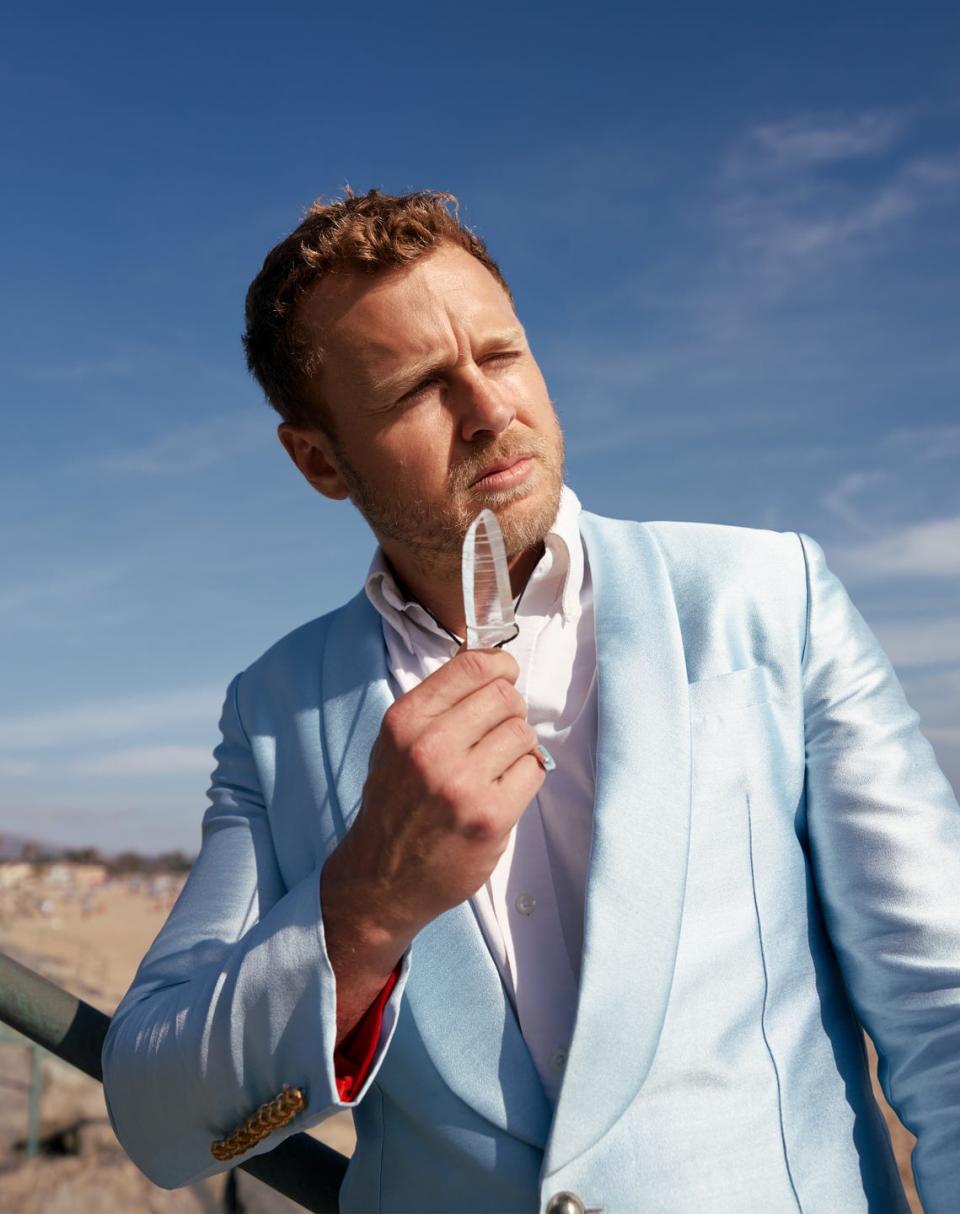
His most lucrative venture at the moment is selling crystals. After picking up Gunner from school, Pratt drives us to Pratt Daddy, the crystal shop he owns in a separate Palisades shopping center. There, one of his female employees, clad in a baggy, pink and purple tie-dye sweatsuit, is selling crystals on a livestream. In a good month, the crystal shop will move more than $300,000 in merchandise.
Perhaps the most surprising thing about Pratt, though, is that he and Montag have stayed together and built a family. “Spencer and Heidi, they were the ones everyone thought weren’t gonna make it,” Jenner says. Who can blame the doubters? A relationship seemingly predicated on fighting for the amusement of a leering public didn’t seem a healthy one, but they’ve been together for more than 15 years now and are trying to get pregnant with their second child. “They proved everybody wrong,” Jenner adds.
Pratt is also a doting, loving father, offering his son nothing but positive reinforcement during our time together. Even as (or, especially as, rather) his son flashes some of Pratt’s signature rambunctiousness. Mid-way through the livestream, Gunner switches off the power strip, turning off the ring light Pratt’s employee was using. Pratt and his son laugh at the prank, and Pratt turns on a dinosaur video to distract the boy for the remainder of the livestream.
I ask Pratt why he doesn’t just settle into life as a small business owner and family man, enjoying his beautiful wife and vibrant son and the life they’ve built together in one of the most coveted neighborhoods in the country. It’s not a celebrity existence, per se, but it’s a life to which many could only ever aspire.
Pratt seems grateful for what he has, but he also understands that when your business is predicated on celebrity, maintaining that celebrity is paramount. “It’s not zero-sum. I can be on a reality show and still enjoy my family,” Pratt tells me in a Notes app message. “But let’s not forget how powerful television is. Why are the Kardashians still on TV? They’re billionaires! It’s because they know that being on camera is going to move product. How will people know about the crystals if they don’t know we exist?”
You Might Also Like

